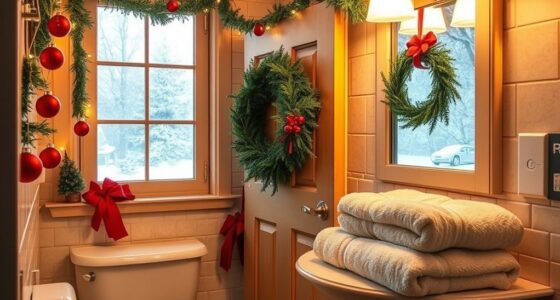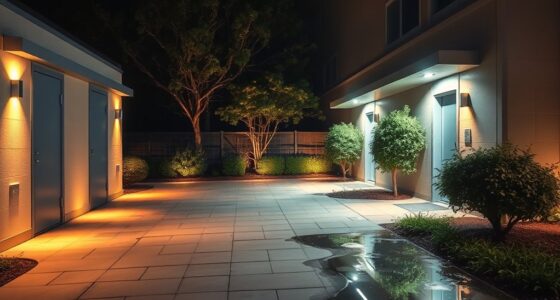To guarantee your backyard wedding has reliable power and water for restrooms, consider renting a portable generator that matches your setup’s wattage needs, and position it safely in a well-ventilated area. For water, set up water tanks or hoses to provide easy access for washing and drinking, and use portable toilets if needed. Proper planning helps avoid disruptions, making your event smooth—keep exploring for more expert tips to perfect your wedding setup.
Key Takeaways
- Use portable generators to supply reliable power for restroom lighting, fans, and other electrical needs during the wedding.
- Install or rent portable toilets strategically to ensure accessibility and sanitation for guests.
- Plan water access with tanks or hoses for cleaning, drinking, and cooking needs, minimizing strain on existing plumbing.
- Ensure proper ventilation and weather protection for generators to maintain safety and continuous power.
- Conduct early planning for power and water solutions to prevent disruptions and create a comfortable, memorable event.

Have you ever considered hosting your wedding in your own backyard? It’s a charming idea that offers intimacy and personal touches, but it also requires some planning—especially when it comes to power and water needs. Without the amenities of a traditional venue, you’ll need to think carefully about how to keep everything running smoothly. Portable generators and septic systems are essential for ensuring your celebration stays comfortable and functional.
A portable generator can be your best friend during a backyard wedding. It provides reliable power for lighting, sound systems, and even small appliances. When choosing a generator, size matters—you want enough wattage to handle all your essential equipment without overloading it. Position the generator in a safe, well-ventilated area, and ensure it’s protected from the elements, so it runs smoothly throughout the event. Remember to have extension cords and power strips on hand to connect everything efficiently. With a dependable portable generator, you won’t have to worry about power outages or being limited by outdoor socket availability. It’s a straightforward way to keep your wedding lively, illuminated, and musical.
Water access is another critical aspect. If your property lacks sufficient plumbing or water lines, setting up a septic system or alternative water solutions is necessary. Septic systems are ideal if you plan a larger gathering, as they handle waste efficiently and keep your backyard sanitary. You might need to consult a professional to install or upgrade your septic system beforehand, ensuring it can cope with the increased usage during the celebration. For smaller or more casual weddings, renting portable toilets can be a practical solution. They can be discreetly placed away from the main event area and serviced as needed. Whichever option you choose, make sure there’s easy access to water for drinking, cooking, and cleaning. Setting up temporary water stations with hoses or water tanks can help keep guests comfortable without strain on your existing plumbing. Additionally, understanding power and water requirements can help you better plan for a seamless event.
Planning ahead with these essentials makes all the difference. Portable generators and septic systems are investments in your backyard wedding’s success, offering convenience and peace of mind. By addressing power and water needs early, you ensure your celebration remains enjoyable and stress-free. With the right equipment, you can focus on celebrating your special day without worrying about outages or sanitation issues. Your backyard can transform into a beautiful, fully functional venue where memories are made effortlessly, all while maintaining the comfort and convenience your guests deserve.
Frequently Asked Questions
What Is the Average Cost of Portable Power Solutions?
You can expect to spend between $300 and $1,500 on portable power solutions, depending on your needs. Solar options are more eco-friendly and quiet but tend to cost more upfront, while generator types like gas or diesel are more affordable initially. For short events, smaller generators around $300 to $600 work well, but for longer or more power-intensive needs, consider larger, more expensive models that provide reliable energy throughout your backyard wedding.
How Long Can a Portable Water Tank Last During an Event?
A portable water tank can last your event based on water consumption and tank capacity. Typically, a 100-gallon tank provides enough water for about 100 to 150 people for a few hours, assuming average usage. If you expect higher water needs or a longer event, consider larger tanks or supplementary sources. Monitor water usage during the event to guarantee your tank doesn’t run dry, and plan accordingly for seamless restroom access.
Are There Eco-Friendly Options for Power and Water?
Yes, you can choose eco-friendly options for power and water at your event. Solar energy provides clean, renewable power, reducing your carbon footprint, while biodegradable supplies minimize environmental impact. You can install solar panels for lighting and small appliances, and opt for biodegradable toilet paper and cleaning products. These choices help create a sustainable celebration that’s enjoyable and environmentally responsible, leaving a positive impact on your guests and the planet.
How Do I Ensure Safety With Temporary Electrical Setups?
Remember, safety first is safety always. To guarantee safety with temporary electrical setups, focus on grounding safety and electrical code compliance. Use grounded outlets and proper circuit breakers, and keep all wiring protected from weather and damage. Regularly inspect connections, and hire a licensed electrician for setup and inspections. Following these steps helps prevent accidents and keeps your celebration safe and enjoyable.
Can These Solutions Handle High-Demand Appliances or Devices?
These solutions can handle high-demand appliances if you choose equipment with sufficient power capacity and water supply. Always check the wattage and flow rates to guarantee they meet your needs. You should also consider the total water demand and power load to prevent overloads. Properly sizing your setup, using dedicated circuits, and ensuring your water source can keep up will help your appliances run smoothly during your event.
Conclusion
Planning a backyard wedding is like building a cozy, self-sufficient oasis—you want everything to flow smoothly. When you resolve power and water issues, it’s like turning on the lights and opening the taps, transforming a simple outdoor space into a magical venue. Just like a well-tended garden blooms beautifully, your careful preparations will ensure your celebration is memorable and stress-free. With the right solutions, your special day will shine as brightly as your dreams.









